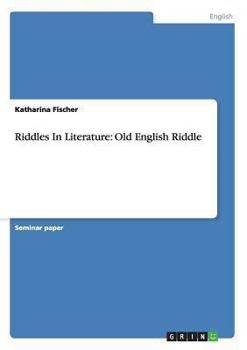Riddles In Literature: Old English Riddle
Seminar paper from the year 2006 in the subject English Language and Literature Studies - Literature, grade: 1,0, University of Kassel (Institut f?r Anglistik und Amerikanistik), language: English, abstract: Riddles and rhymes are very common in English speaking countries; they are even part of oral lore among children and students. True riddles or punning ones with a word of two uses are very popular, i.e. "What runs but never walks? - A river."1 Although they are regarded as special forms funny puzzles, enigmas and sayings were also an important element of poetic diction throughout the history of literature. Old English prose and verse are considered to be the oldest literature written in vernacular, although Latin and Germanic influence is apparent in the Old English language. During the Anglo-Saxon Period and especially under Alfred, King of Wessex, Old English language and poetry reached its highpoint. At this time the clergy was considered as the intellectual elite and so poetry was composed in monasteries and the so called "writing-rooms". The surviving manuscripts include heroic, elegiac and religious elements, as in the Beowulf poem, The Seafarer and The Dream of the Rood. Old English riddles can be found in The Book of Exeter anthology. The collection includes about ninety riddles with heroic, religious and philosophical elements. This special form of poetic diction provides characteristic stylistic devices like alliterative verse and kenning. Besides that, the enigmas had a didactic purpose, as they were intended for religious and linguistic learning at the monastery schools.
Format:Paperback
Language:English
ISBN:3640656571
ISBN13:9783640656578
Release Date:July 2010
Publisher:Grin Verlag
Length:24 Pages
Weight:0.10 lbs.
Dimensions:0.1" x 5.8" x 8.3"
Customer Reviews
0 rating





